ARTICLE AD BOX

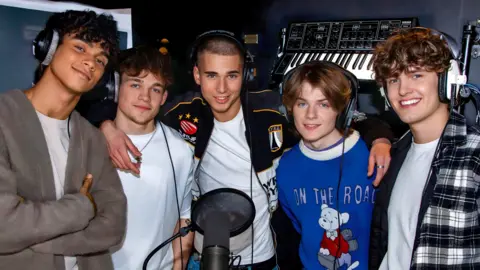 BBC
BBC
Dexter, Blaise, Reese, James and Olly are put through their paces on the show
Millions of screaming fans. A global phenomenon. A multi-billion pound business. No, it's not Taylor Swift (this time). We're talking K-pop.
And with four of 2023's top 10 best-selling acts coming out of South Korea, the Brits want a piece of the action.
Step forward newly created boy band, Dear Alice, who applied to take part in the latest BBC One talent show, Made in Korea: The K-pop Experience.
Meet Blaise, Dexter, James, Olly and Reese. You might be hearing a bit more about them from now on.
None of them knew each other before they individually auditioned and were put together as a band by the showrunners.
The fresh-faced quintet were then flown out to South Korea's capital, Seoul, for 100 days of rigorous K-pop training with stardom in their sights.
Most K-pop training takes years rather than months. Not for the faint-hearted, the boys' experience involved long hours of vocal coaching and learning intricate choreography with a bit of Korean sight-seeing thrown in for good measure (and good TV - the South Korean tourist board will be thrilled).

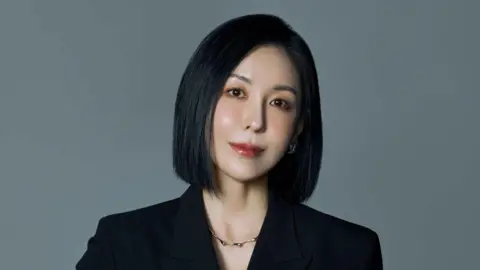
K-pop mogul Hee Jun Yoon is a force to be reckoned with
The six-part series is a collaboration between the BBC, K-pop powerhouse agency SM Entertainment and Moon&Back Media, run by TV veterans Dawn Airey, Nigel Hall and Russ Lindsay, whose back catalogue includes shows such as The X Factor, Britain's Got Talent and Saturday Night Takeaway.
K-pop expert Hee Jun Yoon, the creative force behind some of the biggest K-pop bands of the last 20 years, critiques the band's performance at the end of each week and it's safe to say she pulls no punches. Even the head of BBC unscripted content, Kate Phillips, says Hee Jun "makes Simon Cowell look like Mary Poppins".
Former X Factor head judge Cowell is, of course, launching his own search for a boy band in an upcoming Netflix series which is still in production.
Without giving too much away from Made in Korea's first episode, Hee Jun gives the band a huge wake-up call in week one with some unflinching criticism. "The level of choreo is so basic, it's nursery level." Ouch. Her facial expressions alone could go viral.

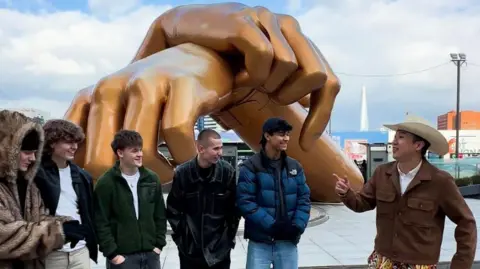
The band enjoy some sightseeing with self-styled tourist guide the K-pop Cowboy
The boys won't be drawn on whether any of them wanted to quit the show at any point. "You'll have to wait and see," says Olly Quinn, 20, from Sunderland, a recent graduate in dance and musical theatre. (Clearly, the media training has also been exacting).
They also won't reveal whether they've signed a record deal yet, only saying they're still "rehearsing hard" and commenting that all the effort and brutal feedback was worth it.
Londoner Dexter Greenwood, 22, who also trained in musical theatre, says: "It was hard work, really challenging but the end justifies the means. Everyone at SM was so supportive but I think we were different to what they expected!"
Reese Carter, 20, from Wiltshire and a former cruise ship performer, adds: "At first it hit hard but we had a great welfare team in place... and it was all done with love.
"They're honest because they want to push us to be that much better. I enjoy the feedback. They're on our side. We had welfare, a life coach, we had people living with us constantly, you could walk downstairs and speak to someone," he adds.
Olly concurs: "It's the brutal honestly. We needed it."
There's certainly a vast difference between the band's performances in episode one and a later video clip journalists were shown at a preview.


Blaise, 19, went to the Brit School in south London
Coco Yeonsoo Do is a K-pop dancer and choreographer, and was a former member of KAACHI, considered the UK’s first K-pop girl group.
“It’s really hard to make a K-pop group reach BTS or Blackpink level,” she tells the BBC, but training is what sets successful groups apart.
“It's very intense and competitive,” says Coco.
One key difference between UK and US pop groups and K-pop ones is how produced the latter are, she adds.
“It’s obvious, but K-pop groups work more like a group, and emphasise the group identity, rather than individuality," she adds.
Following allegations over very strict and punishing training regimes by wannabe K-pop stars over the past few years, Korean press reported the introduction of regulations to ban some unfair practices in contracts between K-pop trainees and entertainment companies.
Clearly welfare has been a priority for the series producers of The K-pop Experience.
Helen Wood is a professor of Media and Cultural Studies at Aston University, and is working on a research project on duty of care in TV.
In 2019, there was a Parliamentary inquiry and Ofcom consultation on the broadcasting code, following a handful of reality stars’ deaths by suicide.
In 2020, the media watchdog announced new rules to protect those taking part in TV shows.
“Now there's more pressure on production to make sure that they're taking due care of the welfare, dignity and wellbeing of participants that go through production,” she says.
“That's not to say that things weren't in place before 2021, but there's now much more regulation.”
Another key difference brought in through the new Ofcom code is a requirement to show audiences that a duty of care to participants is being enacted, she adds.
This means drawing back the curtain to show audiences some of the backstage production processes to ensure they understand and feel confident that contestants are adequately cared for.
A spokesperson for Made in Korea told the BBC: “The welfare of the band members has been at the centre of their training process," adding that there was a "strong support team in place" and that the band's welfare "remains the highest priority".
Reese says they also relied on each other for support.
"We've [the band] grown closer and closer over the last couple of months. Much as it was great to have welfare there, there was a lot of times when we didn't need to go to them because we're strong enough as a group."
Blaise Noon, 19, from London, is the baby of the band but appears to be taking it all in his stride. He is a Brit School graduate and comes across as the most confident.
He says they are really "lucky" to have had the advantage as a British band to be immersed in the Korean training regime: "There's a lot of really good things we can take away to create this hybrid fusion."
Interestingly, most of them have never had any desire to be in a boy band until now.
James Sharp, 23, from Huddersfield, is one half of the Sharp twins, whose TikTok account has amassed 5.5 million followers.
He says he thought boy bands were "cringey", Blaise laughs as he recalls feeling "too cool" for them although Dexter was always a fan. And Olly has had a K-pop education from his auntie who runs K-pop fan pages.
All agree, though, that this was too big an opportunity to pass up.
But how did they come up with the band name?
After Olly's suggestion of British Bulldogs was quickly scotched (can't think why), they stumbled upon a restaurant in Seoul called Dear Alice.
They all liked it and it stuck.
"The 'dear' is like a letter to the fans" and Alice stands for 'a love I can't explain," says Blaine.
More to the point, the restaurant "sold the best beef wellington in the world" according to the lads.
Not exactly your classic Korean dish but Dear Alice will be hoping a similar culture fusion will be the secret to their success.
The first episode of Made in Korea: The K-pop Experience starts on BBC One and BBC iPlayer on Saturday 17 August at 17.15 BST.
Additional reporting by Ruchira Sharma.

 3 months ago
22
3 months ago
22
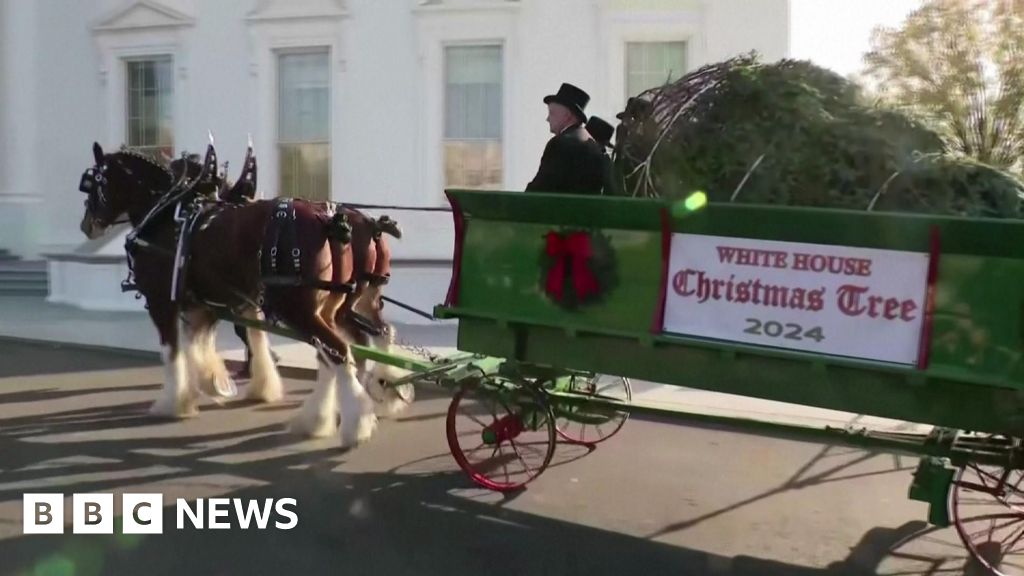
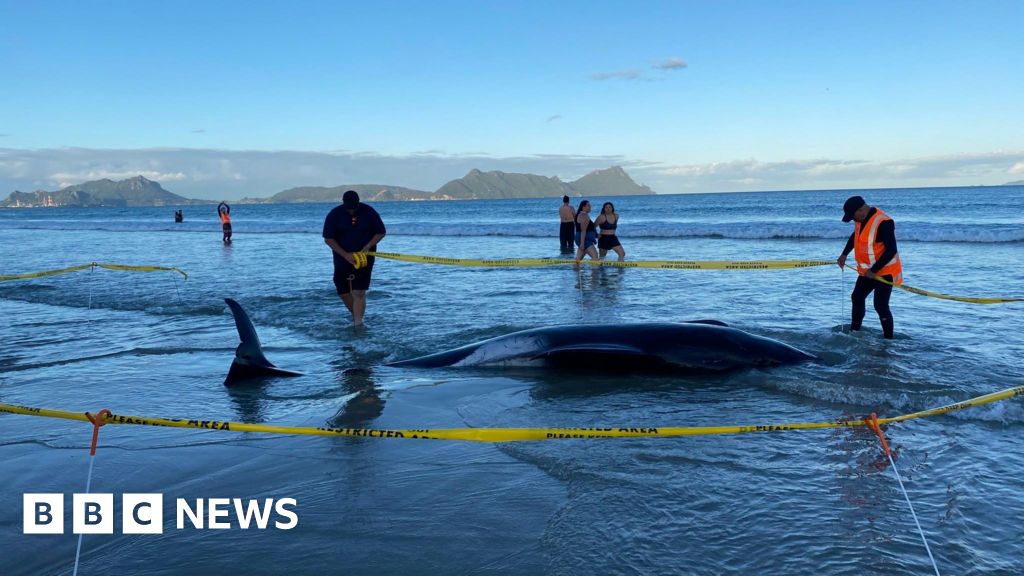
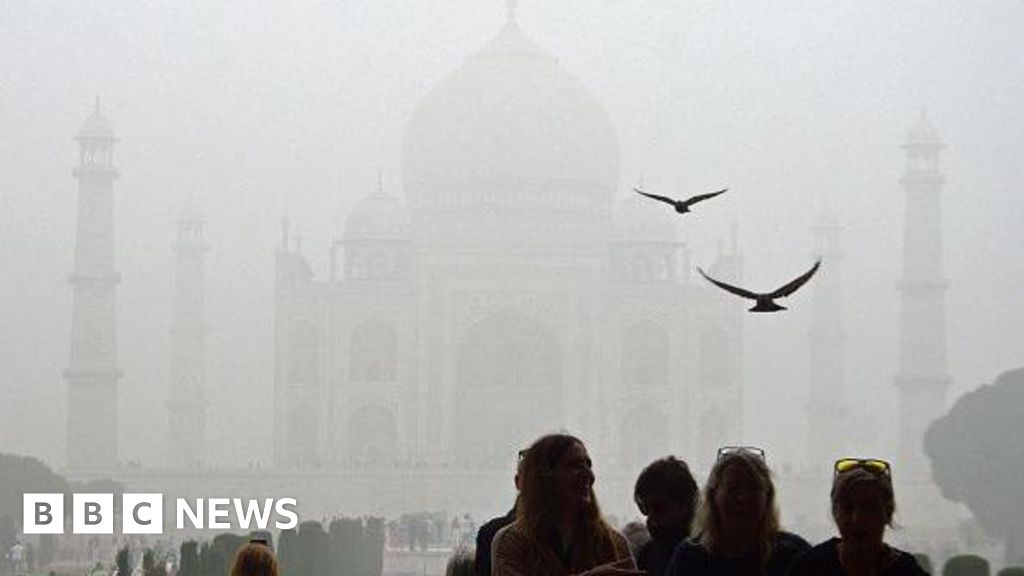





 English (US)
English (US)